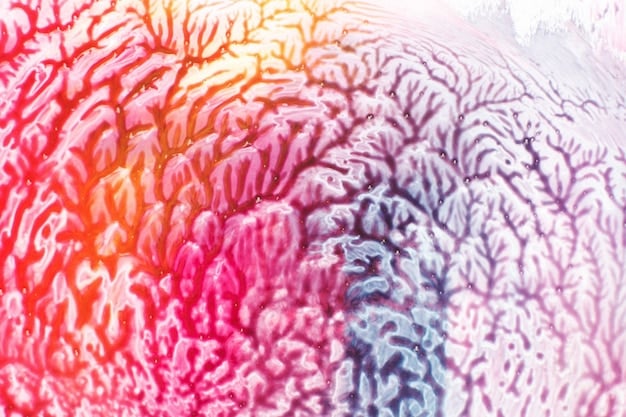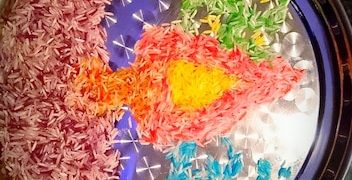The Science of Aging: Latest Research on Longevity

The Science of Aging encompasses a multidisciplinary approach to understanding the biological processes behind aging, exploring potential interventions to promote longevity and healthy aging through cutting-edge research and innovative strategies.
The fountain of youth, a concept that has captivated humanity for centuries, may not be a mythical spring, but a complex puzzle being pieced together by scientists around the globe. The Science of Aging: Exploring the Latest Research on Longevity and Healthy Aging reveals the fascinating advancements in understanding how we age and what we can do to live longer, healthier lives.
Understanding the Basics of Aging
Aging is a multifaceted process, influenced by genetics, lifestyle, and environmental factors. Researchers are delving deep into the cellular and molecular mechanisms to unravel the complexities of aging and identify potential targets for intervention.
The human body, a marvel of biological engineering, is constantly changing. As we age, these changes can lead to a decline in physiological function and increased susceptibility to disease. But what exactly causes these changes?
Cellular Senescence and Aging
Cellular senescence, where cells stop dividing but remain metabolically active, plays a crucial role in aging. These senescent cells can accumulate and release harmful substances, contributing to inflammation and age-related diseases. Targeting these cells is an active area of research.
The Role of Genetics in Longevity
Genetics account for a significant portion of our lifespan. Studies of centenarians (people who live to be over 100) have revealed specific genes associated with longevity. Understanding these genes is crucial to uncovering potential longevity pathways.

Scientists are actively investigating several key factors that influence the aging process. These include:
- Telomere Shortening: Telomeres, protective caps on the ends of our chromosomes, shorten with each cell division. When telomeres become too short, cells can no longer divide, contributing to aging.
- Mitochondrial Dysfunction: Mitochondria, the powerhouses of our cells, become less efficient with age, leading to decreased energy production and increased oxidative stress.
- Inflammation: Chronic inflammation, often referred to as “inflammaging,” is a major contributor to age-related diseases such as heart disease, diabetes, and Alzheimer’s.
In conclusion, understanding the basics of aging involves exploring cellular, genetic, and molecular factors. By addressing these foundational aspects, researchers aim to develop targeted interventions to promote healthier and longer lives.
Dietary Interventions for Healthy Aging
What we eat has a profound impact on how we age. Specific dietary patterns and nutrients have been shown to promote longevity and reduce the risk of age-related diseases. Dietary interventions are a cornerstone of healthy aging strategies.
The adage “you are what you eat” holds true, especially when it comes to aging. Our diet not only fuels our bodies but also influences the aging process at a cellular level. Let’s explore how specific dietary interventions can promote healthy aging.
Caloric Restriction and Intermittent Fasting
Caloric restriction, reducing calorie intake without malnutrition, has consistently shown longevity benefits in various organisms. Intermittent fasting, cycling between periods of eating and fasting, also demonstrates similar effects.
The Mediterranean Diet and Aging
The Mediterranean diet, rich in fruits, vegetables, whole grains, and healthy fats, is associated with reduced risk of cardiovascular disease, cognitive decline, and overall mortality. It’s a dietary pattern that supports healthy aging.
Key dietary components known to promote healthy aging include:
- Antioxidants: Found in colorful fruits and vegetables, antioxidants combat oxidative stress, a major contributor to aging.
- Omega-3 Fatty Acids: Present in fatty fish, flaxseeds, and walnuts, omega-3s reduce inflammation and support brain health.
- Fiber: Abundant in whole grains, legumes, and vegetables, fiber promotes gut health and helps regulate blood sugar levels.

In summary, dietary interventions play a vital role in healthy aging. Caloric restriction, intermittent fasting, and the Mediterranean diet are examples of strategies that can promote longevity by influencing cellular processes and reducing disease risk.
The Role of Exercise in Extending Lifespan
Physical activity is a powerful tool for promoting healthy aging. Regular exercise can improve cardiovascular health, maintain muscle mass, boost cognitive function, and extend lifespan. Exercise is an essential component of a comprehensive anti-aging strategy.
Staying active isn’t just about adding years to your life—it’s about adding life to your years. Exercise has a profound impact on the aging process, affecting everything from your heart health to your brain function.
Cardiovascular Exercise and Aging
Cardiovascular exercise, like running, swimming, or cycling, strengthens the heart and improves blood flow. These activities reduce the risk of heart disease, stroke, and other cardiovascular conditions, which are leading causes of mortality.
Strength Training and Muscle Mass
Strength training, using weights or resistance, helps maintain and build muscle mass. Muscle mass declines with age, leading to decreased strength and mobility. Strength training can counteract this decline and improve physical function.
Benefits of regular exercise for healthy aging:
- Improved Cognitive Function: Exercise increases blood flow to the brain, promoting cognitive function and reducing the risk of cognitive decline.
- Reduced Inflammation: Physical activity helps regulate the immune system and reduce chronic inflammation, a major contributor to age-related diseases.
- Enhanced Bone Density: Weight-bearing exercises, like walking and running, promote bone density and reduce the risk of osteoporosis.
In conclusion, exercise is a potent intervention for extending lifespan and promoting healthy aging. Cardiovascular exercise and strength training offer unique benefits, improving cardiovascular health, maintaining muscle mass, and boosting cognitive function.
The Impact of Sleep on Longevity
Quality sleep is essential for healthy aging. Getting enough sleep helps regulate hormones, repair tissues, consolidate memories, and reduce inflammation. Prioritizing sleep is crucial for overall health and longevity.
Often overlooked, sleep plays a critical role in our overall health and longevity. It’s not just about feeling rested; adequate sleep has far-reaching benefits that influence the aging process.
Sleep and Hormonal Regulation
Sleep regulates hormones such as growth hormone and cortisol. Disruptions to sleep can lead to hormonal imbalances, increasing the risk of metabolic disorders and age-related diseases.
Sleep and Cognitive Function
During sleep, the brain consolidates memories and clears out toxins. Chronic sleep deprivation can impair cognitive function and increase the risk of Alzheimer’s disease and other neurodegenerative disorders.
Key aspects of sleep that promote healthy aging include:
- Sufficient Duration: Aim for 7-9 hours of sleep per night to allow the body to fully repair and rejuvenate.
- Consistent Schedule: Maintain a regular sleep-wake cycle to regulate your body’s internal clock and improve sleep quality.
- Optimal Sleep Environment: Create a dark, quiet, and cool sleep environment to promote restful sleep.
In summary, quality sleep is a cornerstone of healthy aging. It regulates hormones, consolidates memories, and reduces inflammation. Prioritizing sleep is a simple yet powerful way to promote overall health and longevity.
The Gut Microbiome and Aging
The gut microbiome, the community of microorganisms living in our digestive tract, plays a vital role in aging. A healthy gut microbiome supports immune function, reduces inflammation, and protects against age-related diseases. Nurturing a healthy gut is essential for promoting longevity.
The gut microbiome is increasingly recognized as a key player in our overall health and aging. These tiny organisms influence everything from our digestion to our immune function, making them a crucial target for promoting longevity.
The Gut Microbiome and Immune Function
The gut microbiome interacts closely with the immune system, helping to train immune cells and regulate immune responses. A diverse and balanced gut microbiome supports a healthy immune system and reduces the risk of autoimmune diseases.
The Gut Microbiome and Inflammation
An imbalance in the gut microbiome, known as dysbiosis, can lead to chronic inflammation. Dysbiosis has been linked to age-related diseases such as inflammatory bowel disease, arthritis, and cardiovascular disease.
Strategies to promote a healthy gut microbiome for healthy aging:
- Probiotics: Consume probiotic-rich foods, like yogurt and kefir, or take probiotic supplements to introduce beneficial bacteria into the gut.
- Prebiotics: Eat prebiotic-rich foods, like garlic, onions, and bananas, to feed and nourish the beneficial bacteria in the gut.
- Diverse Diet: Consume a wide variety of plant-based foods to provide a diverse range of nutrients for the gut microbiome.
In conclusion, the gut microbiome plays a significant role in aging. By nurturing a healthy gut microbiome, we can support immune function, reduce inflammation, and protect against age-related diseases, ultimately promoting longevity.
Stress Management Techniques for Longevity
Chronic stress can accelerate aging and increase the risk of age-related diseases. Effective stress management techniques can help mitigate the negative effects of stress and promote healthy aging. Managing stress is an integral part of a longevity strategy.
In today’s fast-paced world, stress is an unavoidable part of life. However, chronic stress can take a toll on our health and accelerate the aging process. Learning effective stress management techniques is crucial for promoting longevity and well-being.
Mindfulness Meditation and Stress Reduction
Mindfulness meditation involves focusing on the present moment without judgment. Regular mindfulness practice can reduce stress hormones, improve mood, and enhance overall well-being.
Social Connections and Support
Strong social connections and support networks can buffer against the negative effects of stress. Spending time with loved ones, participating in social activities, and seeking support from others can promote resilience and well-being.
Practical stress management techniques for healthy aging:
- Deep Breathing Exercises: Practice deep breathing exercises to activate the parasympathetic nervous system and promote relaxation.
- Yoga and Tai Chi: Engage in yoga and tai chi to reduce stress hormones, improve flexibility, and enhance overall well-being.
- Time in Nature: Spend time outdoors in natural settings to reduce stress levels and promote mental and physical health.
In summary, managing stress is essential for promoting longevity. Mindfulness meditation, social connections, and practical stress management techniques can help mitigate the negative effects of stress and promote healthy aging.
| Key Point | Brief Description |
|---|---|
| 🧬 Genetics & Aging | Certain genes are linked to longevity, offering insights into potential pathways. |
| 🥗 Mediterranean Diet | Rich in fruits, veggies, and healthy fats, reducing cardiovascular disease risk. |
| 💪 Regular Exercise | Improves heart health, maintains muscle, boosts cognitive function, extending lifespan. |
| 😴 Quality Sleep | Essential for hormone regulation, tissue repair, and cognitive function. |
Frequently Asked Questions
▼
The science of aging is a multidisciplinary field that studies the biological, psychological, and social factors that contribute to the aging process. It seeks to understand how and why we age, and ways to promote healthy aging.
▼
Diet significantly impacts aging through mechanisms like caloric restriction, antioxidant intake, and supporting healthy gut bacteria. A balanced diet reduces the risk of age-related diseases, promoting longevity.
▼
Exercise counters age-related decline by improving cardiovascular health, maintaining muscle mass, and enhancing cognitive function. It supports a healthier, more active lifestyle and reduces the risk of chronic diseases.
▼
Sleep allows the body to repair, rejuvenate, and regulate hormones. Without it, cognitive function declines, and chronic sleep deprivation increases disease risk. Consistent sleep habits promote overall health and longevity.
▼
Stress management techniques help mitigate the harmful effects of chronic stress, which accelerates aging and increases the risk of age-related diseases. Effective stress management promotes overall well-being and longevity.
Conclusion
Exploring the science of aging reveals that longevity is a product of multiple interconnected factors, including genetics, diet, exercise, sleep, gut health, and stress management. By understanding and implementing these strategies, individuals can significantly improve their chances of living longer and healthier lives.





